Rose Petal Sourdough Bread With White Chocolate & Cinnamon
This post may contain affiliate links.
This sourdough bread features a unique blend of rose petals, creamy white chocolate, and warm cinnamon—perfect for when you want something a little special. Soft, aromatic, and just sweet enough, it’s a beautiful loaf for slow mornings or thoughtful gifting.
I think this loaf gives Mother's Day vibes ... but of course, you could make it for any occasion! If you are celebrating Mother's Day, you might like this collection of Mother's Day sourdough recipes.
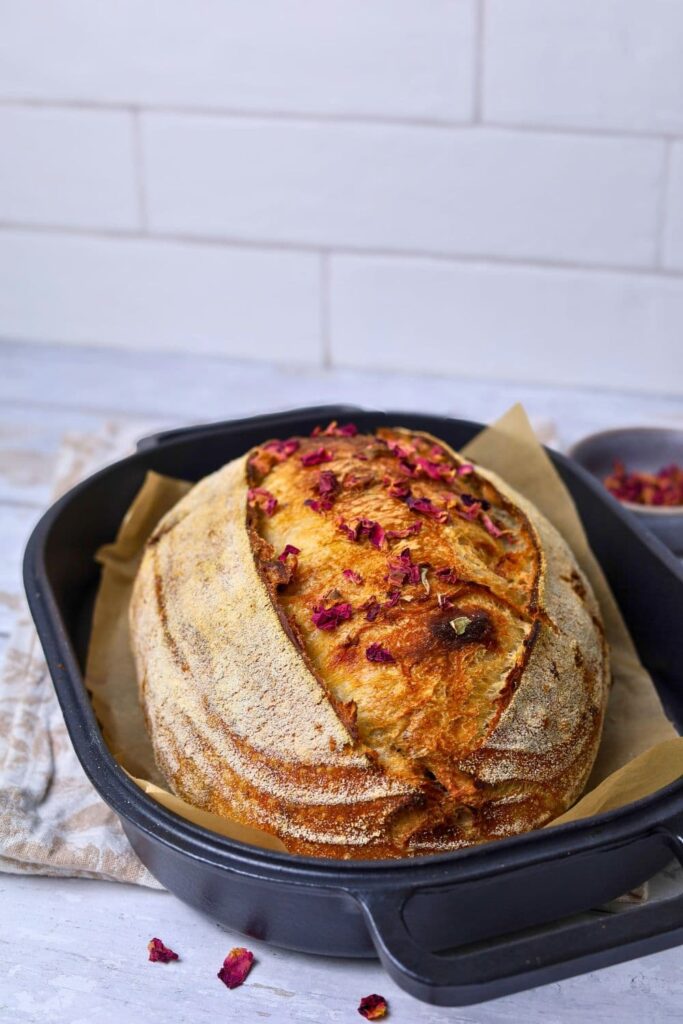
Why You'll Love This Recipe!
Romantic Flavor Combo – The blend of delicate rose petals, sweet white chocolate, and cozy cinnamon creates a soft, floral, and comforting flavor that feels like a treat for the senses.
Unique – This isn’t your everyday loaf—it’s eye-catching, fragrant, and perfect for gifting or special occasions. It's definitely a loaf I'd describe as "a little extra"!
Soft, Sweet, and Tangy – The natural tang of sourdough balances the sweetness, giving you a complex, not-too-sweet bite with a tender crumb and just the right touch of decadence.
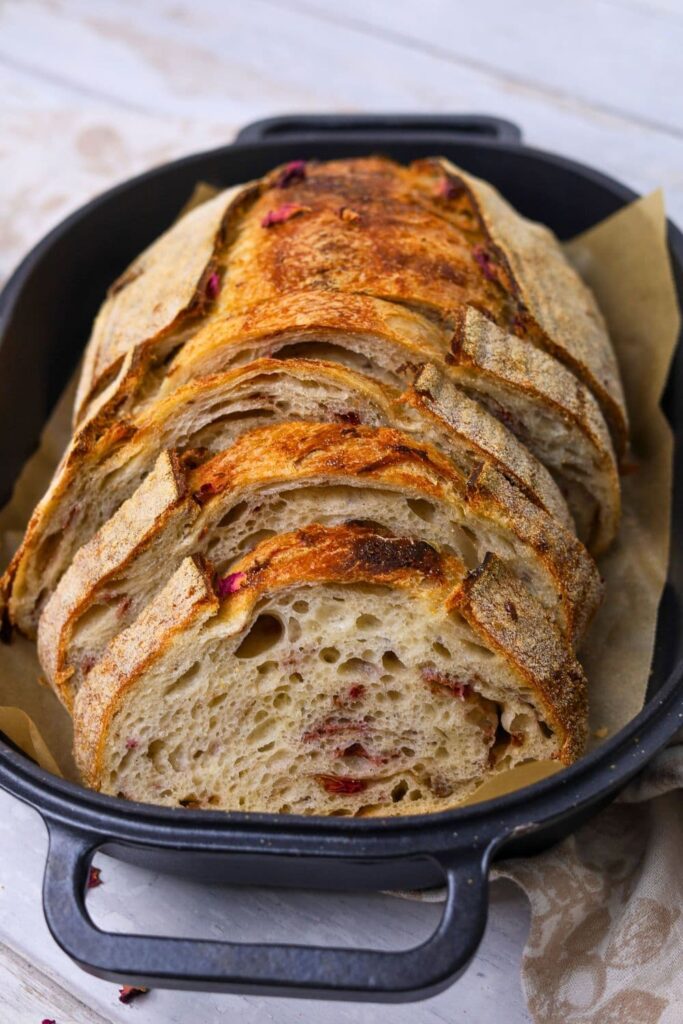
Ingredients
- Sourdough Starter - as always, an active, fed and happy sourdough starter is necessary to rise this beautifully fragrant loaf.
- Water - just regular water, although check out the notes further down for adding rosewater or rose extract if you're not able to use rose petals.
- Bread Flour - as always, use a good quality bread flour for the best results.
- Salt - salt is necessary for both flavor and development of gluten!
- Vanilla Bean Paste - I've used vanilla bean paste for this recipe to add a delicate vanilla flavor to the dough which compliments the rose petals so well. If you don't have paste and need to use extract, it's better to add it with the water at initial mixing of the dough.
- Rose Petals - organic, dried food grade rose petals are perfect for this delicate sourdough loaf. I've tested this recipe multiple times to get the the perfect amount of flavor, without tasting soapy. I do not recommend adding extra rose petals. If you don't have access to rose petals, you can use some rose water extract to re create the flavor. Add 1 teaspoon of extract along with the water.
- Cinnamon - I love the warmth that cinnamon brings to this flavor combination. Cinnamon can hamper fermentation, so it's best to leave the cinnamon out of the mix until shaping.
- Brown Sugar & All Purpose Flour - I've added a sprinkle of brown sugar at shaping to give this loaf a hint of sweetness to go along with the delicate aroma of the rose petals. The brown sugar won't leak out because it's mixed in with some all purpose flour.
- White Chocolate - you can use white chocolate chips or your favorite white chocolate chopped or grated.
You'll find specific measurements in the recipe card further down the page.
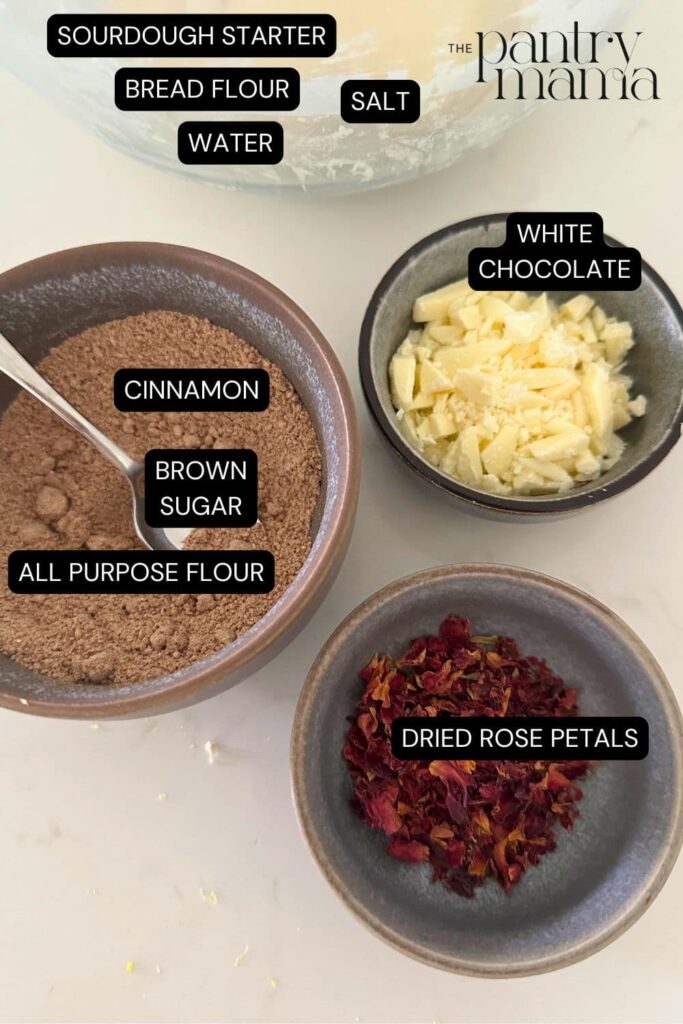
How to Make Rose Petal Sourdough Bread
Making sourdough bread infused with dried rose petals, cinnamon and white chocolate is such a beautiful process. I really loved creating this recipe because the inclusions were so fragrants and gorgeous to work to with and every part of the process was such a joy.
I feel like stretching and folding the vanilla and rose petals into the dough was almost an aromatic experience!
Pre Mix & Autolyse
Weigh out your starter and water in a glass or ceramic bowl. Mix them together so that the sourdough starter is dissolved in the water (or at least really well distributed).
Then add your flour and salt and mix altogether with the end of a spatula. The dough will be fairly shaggy and only just brought together.
Cover your bowl with cling film or a damp tea towel and let it sit for around 1 hour.
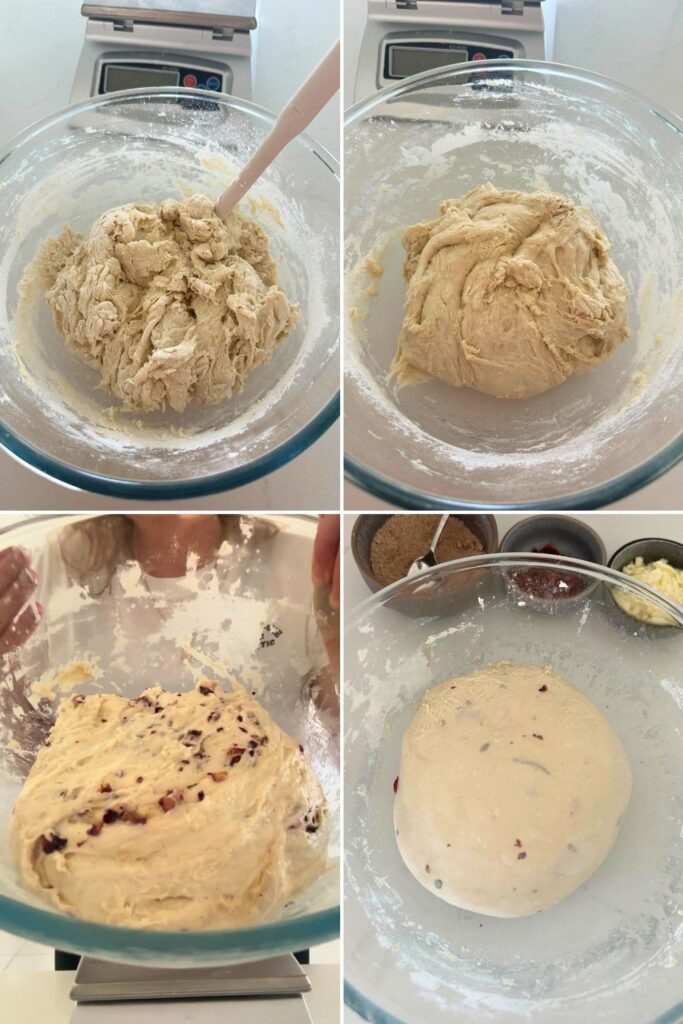
Forming Up Your Dough
Work your way around the bowl, grabbing the dough from the outside, stretching it up and over itself until a smooth ball is formed. You shouldn't need more than about 20-25 folds to form the ball.
Once the dough has formed into a smooth ball, pop the cling film back on and let it rest for 30 minutes.
Stretch & Fold - Creating Structure
You need to add the vanilla extract paste and half the rose petals to your dough during the stretch and fold phase. It's very easy to do! Try to add them around the second or third set of stretch and folds.
So do your first set of stretch and folds with the dough as is and then add the inclusions on the second (or third) set depending on how your dough is behaving.
Try to do around 4 sets of stretch and folds with around 15 to 30 minutes between each set.
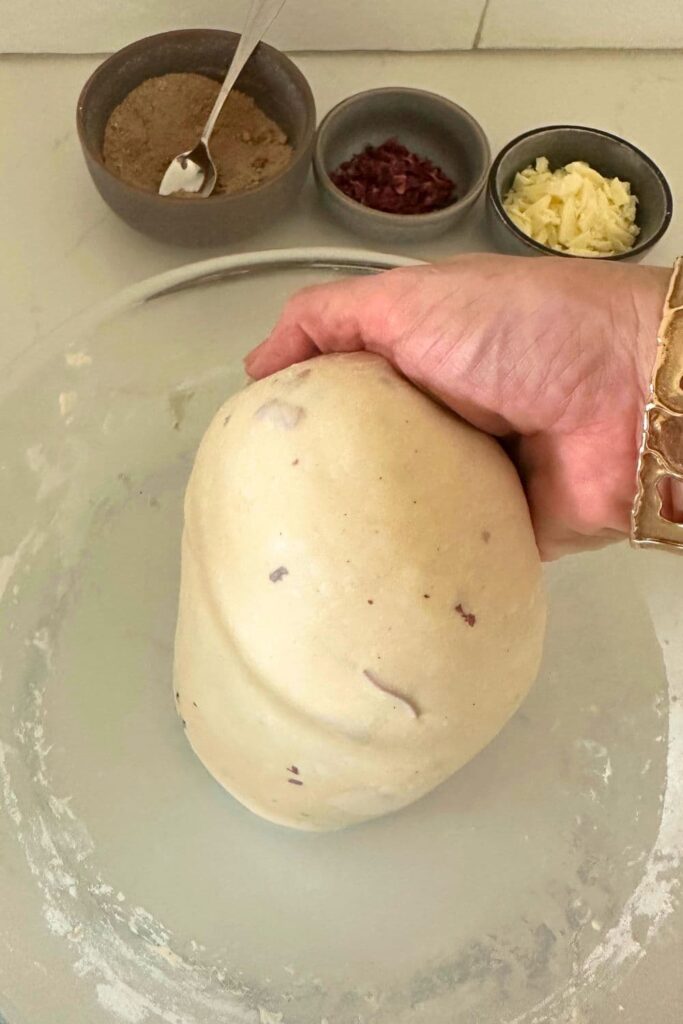
Bulk Ferment
Once you've finished your stretch and folds, place the cling film or damp tea towel back over your dough and let it rest and bulk ferment at room temperature. You want the dough to double during this time.
While your dough is fermenting, take a small bowl and mix the cinnamon, brown sugar and all purpose flour together. Set this aside until you're ready to shape your dough.
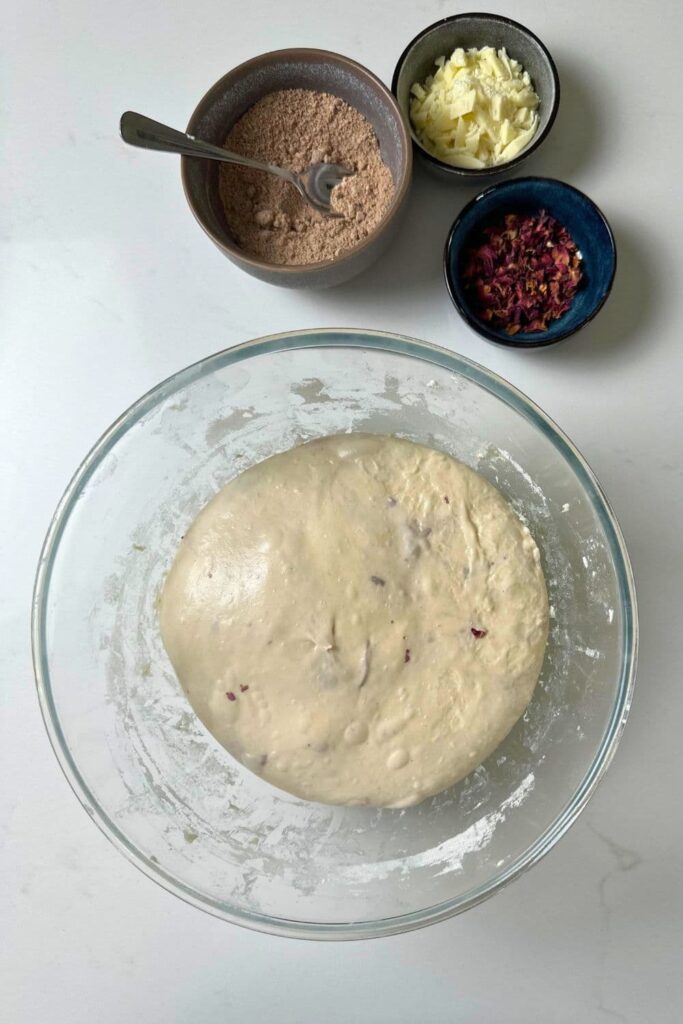
Shaping Your Dough
Once your dough has finished its first ferment, it's time to give it some shape and surface tension and add the spices, white chocolate and rest of the rose petals that you've kept aside.
I think this recipe lends itself to a batard however it's completely up to you what shape you would like. Stretch your dough out into a rough rectangle and sprinkle over a generous amount of the cinnamon mixture. Sprinkle on some of the white chocolate and rose petals.
Fold the top down and sprinkle on some more of the cinnamon mix and other inclusions. Fold the sides in, sprinkle some more. Roll up the dough like a burrito and pull it towards you to create some surface tension and ensure all of those beautiful petals and cinnamon are tucked up inside.
Place the shaped dough into your banneton with the seam side up. Stitch the base together if you need to.
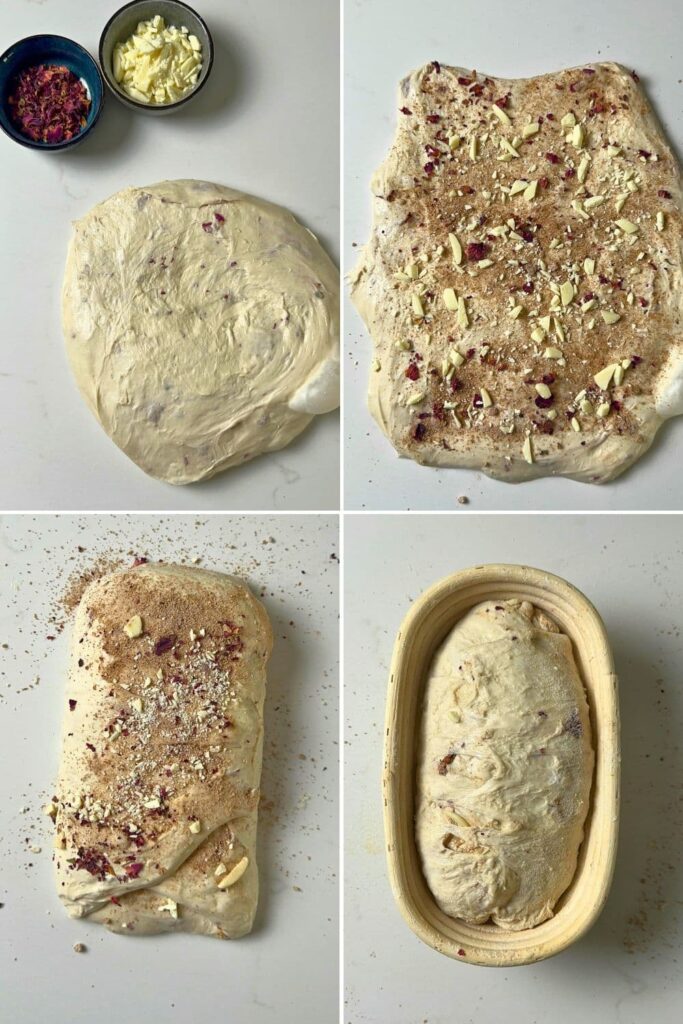
Cold Ferment
Now your dough is in it's "shaping container" cover it loosely with a plastic bag or damp tea towel and place into the fridge to cold ferment. Try to leave it in the fridge for a minimum of 5 hours. I don't like to leave this loaf in the fridge for too long - generally I don't leave it more than 12 hours.
Preparing to Bake Your Sourdough
Once you're ready to bake your sourdough, you'll need to preheat your oven to 230C/450F. Place your Dutch Oven into the oven when you turn it on so it gets hot.
Baking Your Sourdough
Now it's time to bake!When your oven is at temperature. Take your sourdough out of the fridge. Gently place it onto a piece of baking paper. Gently score your bread with a lame, clean razor blade or knife.
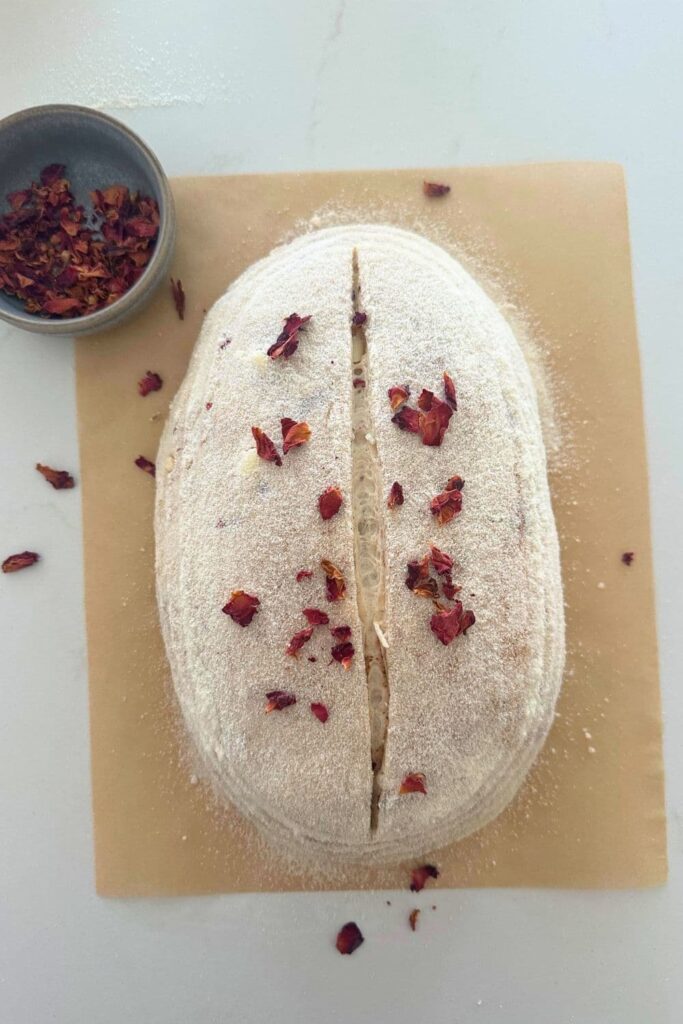
Carefully take your dutch oven out of the oven. Place the sourdough into the pot using the baking paper as a handle. Put the lid on and place into the hot oven.
BAKE TIME
30 Minutes with the lid on at 230C/450F plus
10-15 Minutes with the lid off at 210C/410F
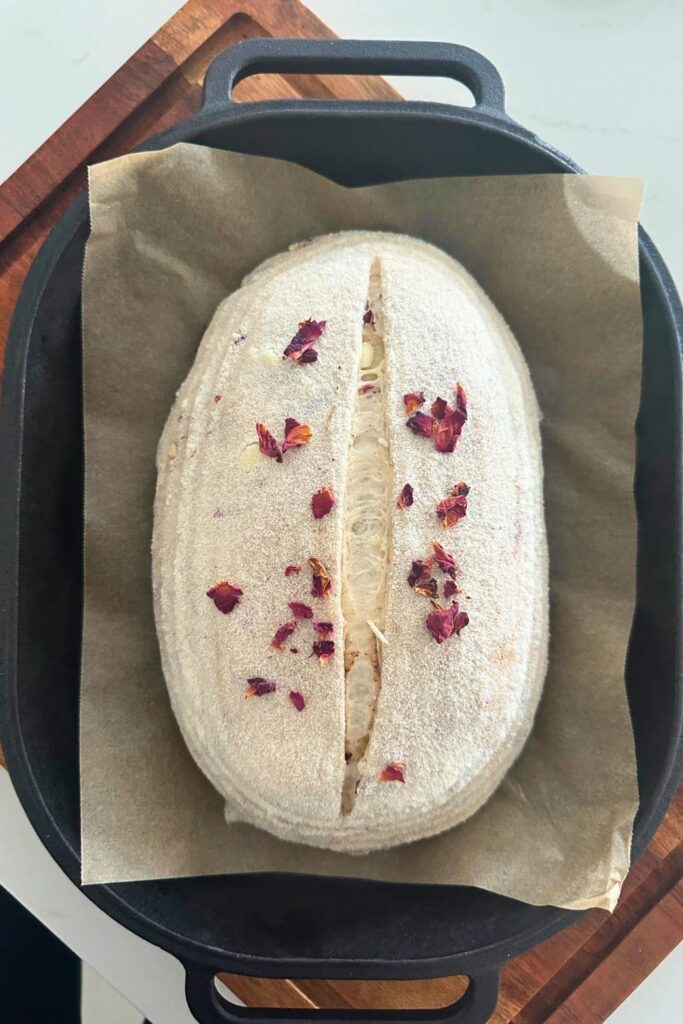
If you're worried about the base of your bread burning, place a baking sheet on the shelf underneath your Dutch Oven - it works!
When you remove your dough from the oven, carefully remove it from the dutch oven as soon as possible and place on a wire rack to cool.
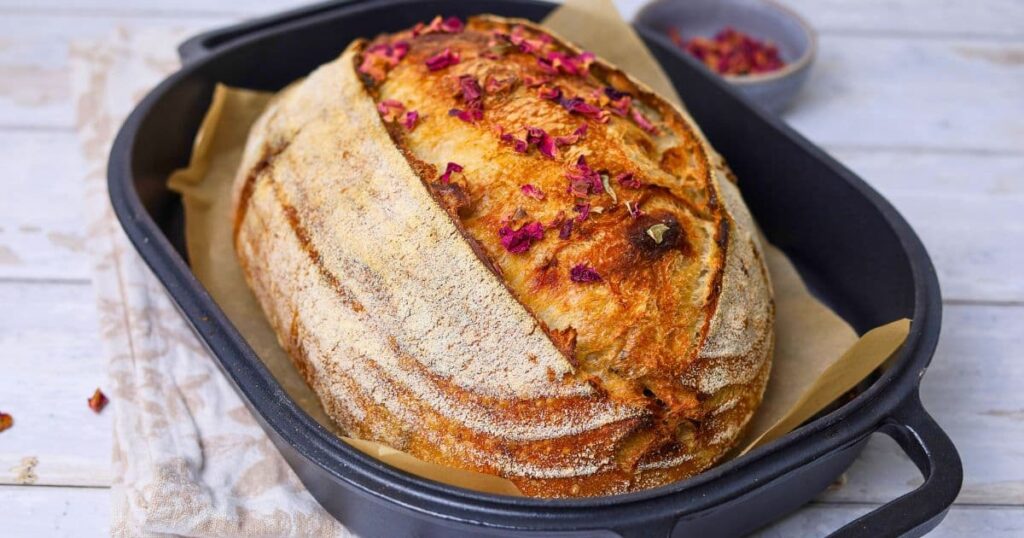
Baker's Timeline
This is a sample baking timeline for making a rose petal and white chocolate sourdough loaf. You will need to adjust the times to suit your own temperature and environment, but this timeline works well for my sourdough starter and kitchen temperature.
| TIME | PROCESS |
|---|---|
| 9 am | Premix and autolyse for around an hour, forming up the dough and leaving to rest for another 30 minutes before stretch and folds. |
| 11 am | 1st stretch and fold. |
| 11.30 am | 2nd stretch and fold - add half the rose petals and the vanilla paste. |
| 12 pm | 3rd stretch and fold - continue working the rose petals and vanilla paste through the dough. |
| 12.30 pm | 4th stretch and fold. |
| 1 pm | Bulk fermentation at room temperature. |
| 6 pm | Shape dough into a batard, place into banneton and then into fridge for cold fermentation. |
| 6 am | Wake and bake! The next morning, you can get up, make a coffee and bake your rose petal sourdough bread! |
Notes & Tips
I had so much fun creating this recipe and in testing it I discovered lots of little nuances and tips that I thought I'd share to help you bake a successful loaf!
- If you can't get hold of any food grade rose petals, you can use rose water or rose extract to flavor the loaf instead. This can be added with the water during the initial mix and autolyse stage.
- I recommend using dried rose petals rather than fresh as they are much easier to work with. Just make sure that the rose petals you're using are organic, food grade rose petals. Fresh petals tend to lose their color and go slimy in the dough, so dried are a much better choice when working with dough.
- To make some of the rose petals stick to the top of the loaf, you can sprinkle some of the dried rose petals into your banneton before placing the loaf on top.
- For something extra special, a sprinkling of shelled pistachios make a gorgeous addition along with the white chocolate at shaping.
How To Store + Freeze
I recommend eating or gifting this loaf on the day of baking.
I do not recommend freezing this loaf.
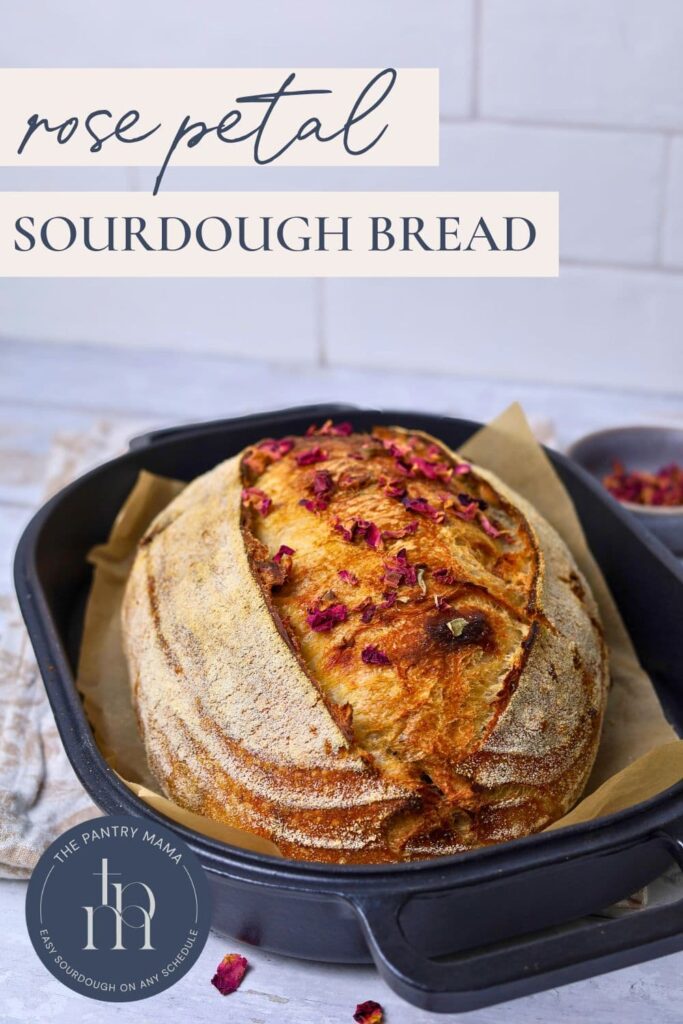

Rose Petal Sourdough Bread
Equipment
- Mixing Bowl
- Digital Scale
- Banneton
- Dutch Oven
Ingredients
Bread Dough
- 100 g Sourdough Starter
- 350 g Water
- 500 g Bread Flour
- 10 g Salt
Added During Stretch and Folds
- 5 g Vanilla Bean Paste (see notes)
- 2 g Rose Petals (dried, crushed, food grade)
Added During Shaping
- 1 teaspoon Cinnamon (ground)
- 15 g All Purpose Flour
- 25 g Brown Sugar
- 2 g Rose Petals (dried, crushed, food grade)
- 40 g White Chocolate (chopped)
Instructions
- Pre Mix & Autolyse:Weigh out your starter and water in a glass or ceramic bowl. Mix them together so that the sourdough starter is dissolved in the water (or at least really well distributed).Then add your flour and salt and mix altogether with the end of a spatula. The dough will be fairly shaggy and only just brought together.Cover your bowl with cling film or a damp tea towel and let it sit for around 1 hour.
- Forming Up Your Dough:Work your way around the bowl, grabbing the dough from the outside, stretching it up and over itself until a smooth ball is formed. You shouldn't need more than about 20-25 folds to form the ball.Once the dough has formed into a smooth ball, pop the cling film back on and let it rest for 30 minutes.
- Stretch & Fold - Creating Structure:You need to add the vanilla extract paste and half the rose petals to your dough during the stretch and fold phase. It's very easy to do! Try to add them around the second or third set of stretch and folds. So do your first set of stretch and folds with the dough as is and then add the inclusions on the second (or third) set depending on how your dough is behaving. Try to do around 4 sets of stretch and folds with around 15 to 30 minutes between each set.
- Bulk Ferment:Once you've finished your stretch and folds, place the cling film or damp tea towel back over your dough and let it rest and bulk ferment at room temperature. You want the dough to double during this time.While your dough is fermenting, take a small bowl and mix the cinnamon, brown sugar and all purpose flour together. Set this aside until you're ready to shape your dough.
- Shaping Your Dough:Once your dough has finished its first ferment, it's time to give it some shape and surface tension and add the spices, white chocolate and rest of the rose petals that you've kept aside.I think this recipe lends itself to a batard however it's completely up to you what shape you would like. Stretch your dough out into a rough rectangle and sprinkle over a generous amount of the cinnamon mixture. Sprinkle on some of the white chocolate and rose petals. Fold the top down and sprinkle on some more of the cinnamon mix and other inclusions. Fold the sides in, sprinkle some more. Roll up the dough like a burrito and pull it towards you to create some surface tension and ensure all of those beautiful petals and cinnamon are tucked up inside.Place the shaped dough into your banneton with the seam side up. Stitch the base together if you need to.
- Cold Ferment:Now your dough is in it's "shaping container" cover it loosely with a plastic bag or damp tea towel and place into the fridge to cold ferment.Try to leave it in the fridge for a minimum of 5 hours. I don't like to leave this loaf in the fridge for too long - generally I don't leave it more than 12 hours.
- Preparing to Bake Your Sourdough:Once you're ready to bake your sourdough, you'll need to preheat your oven to 230C/450F. Place your Dutch Oven into the oven when you turn it on so it gets hot.
- Baking Your Sourdough:Now it's time to bake!When your oven is at temperature. Take your sourdough out of the fridge. Gently place it onto a piece of baking paper.Gently score your bread with a lame, clean razor blade or knife.Carefully take your dutch oven out of the oven. Place the sourdough into the pot using the baking paper as a handle. Put the lid on and place into the hot oven. BAKE TIME:30 Minutes with the lid on at 230C/450F plus10-15 Minutes with the lid off at 210C/410FIf you're worried about the base of your bread burning, place a baking sheet on shelf underneath your Dutch Oven - it works!
- Finishing Your Bake:When you remove your dough from the oven, carefully remove it from the dutch oven as soon as possible and place on a wire rack to cool.
Notes
- Notes on Sourdough Starter - This recipe is based on you having an active starter that you have fed a few hours before starting your bake. For information on whether your starter is ready, go here. I've used 100g of starter, but you can use less if you're baking in warmer temperatures. You can read about how to adjust the amount of starter you use here.
- Rose Petals - I've used dried, organic food grade rose petals. Make sure whatever petals you use are food grade and have not been sprayed with anything. I've never used fresh petals, only ever dried.
- Vanilla Bean Paste - I've used vanilla bean paste which is thicker than extract so doesn't affect the hydration of the dough. I recommend using paste and not extract.
- Notes on Stretch & Folds - This loaf requires you to add a lot of inclusions during stretch and folds so just take it easy. The dough will tear a little but just let it rest and it will recover and absorb all of the inclusions.
- Spice Mixture & All Purpose Flour - I've added all purpose flour to the spice mixture as this can stop the brown sugar from leaking out during cold fermentation. I also recommend not letting this loaf cold fermenting for too long (I generally don't let it cold ferment for more than 12 hours).
- Notes on Baking - If you're worried about the base of your bread burning, place a baking sheet on shelf underneath your Dutch Oven - it works! If you're worried about your bread not being cooked all the way through, turn the oven off and place your dough straight onto the oven rack. Leave the door ajar and let your bread rest there for a few hours. Remember not to cut into your loaf too soon - you'll need to let it cool for at least a few hours (4-6 is best).
Nutrition


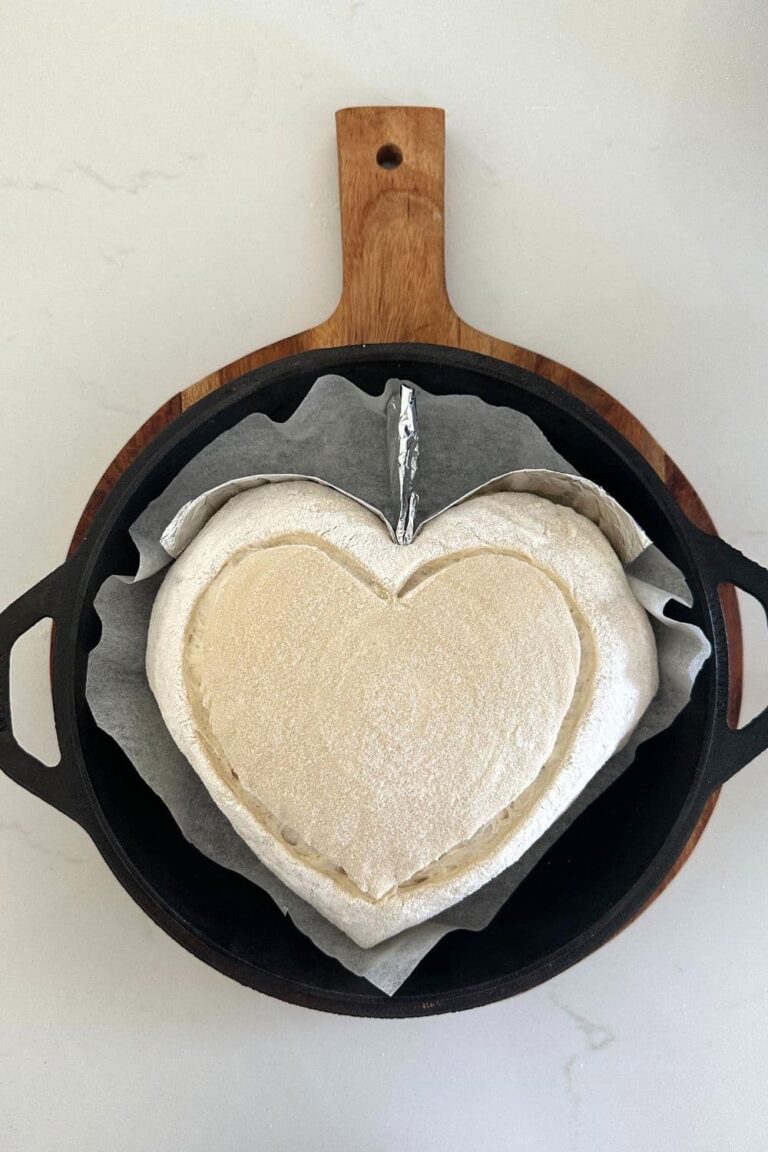
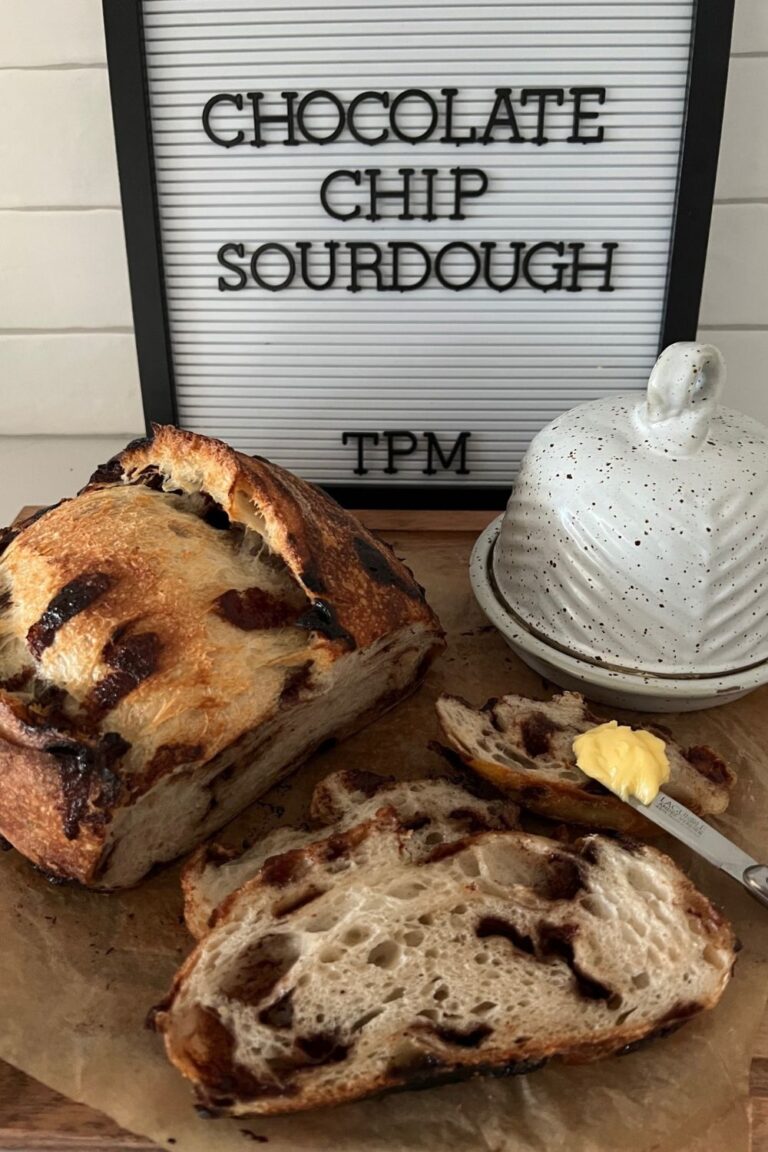
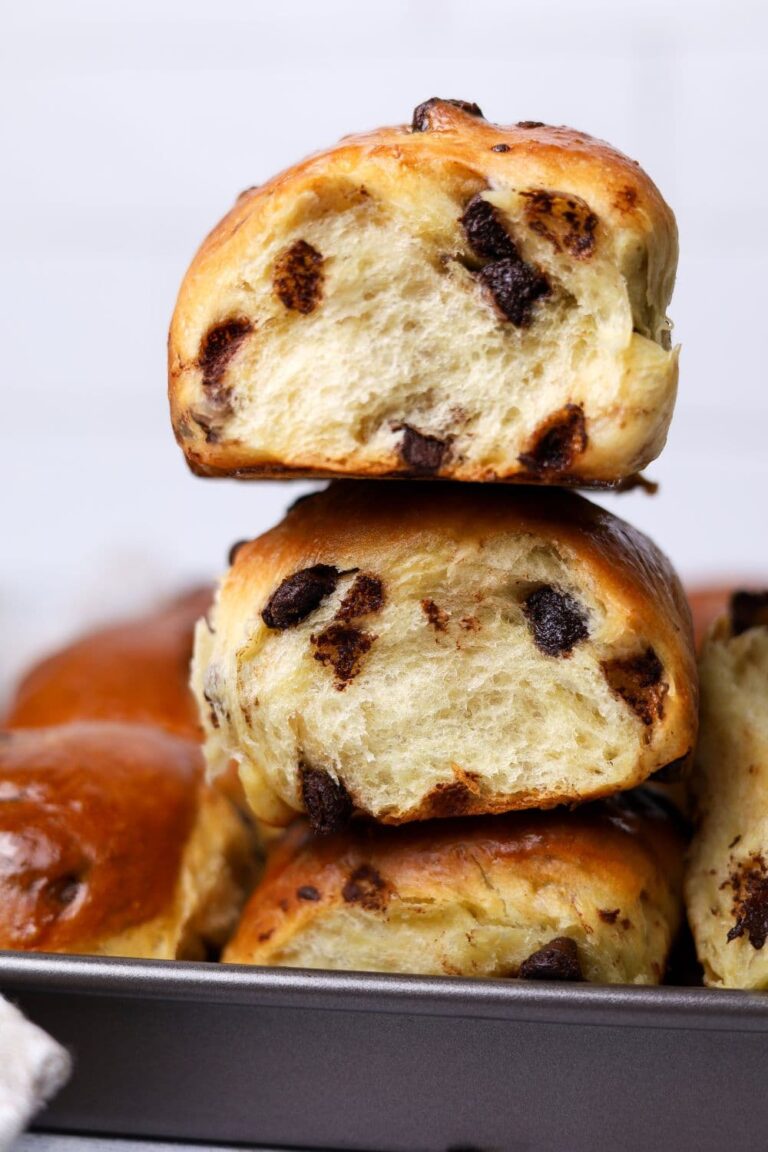
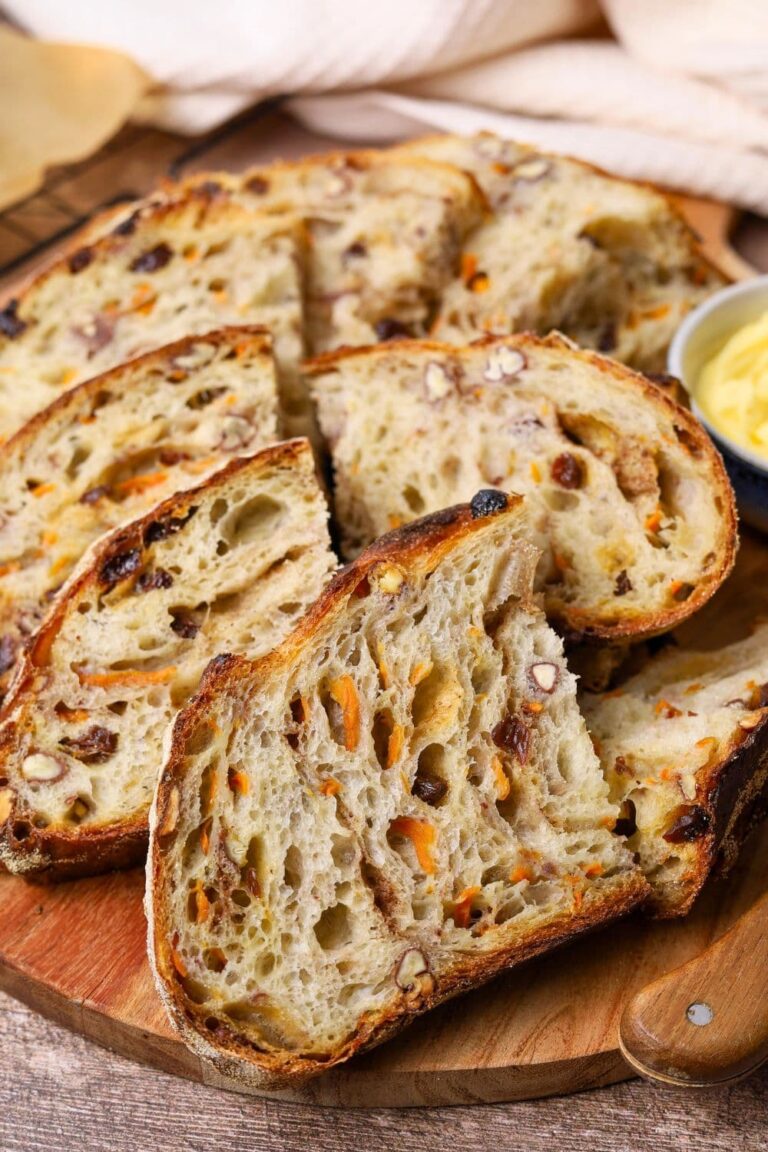

Hi Kate,
I love your website, you make sourdough so easy to understand and your recipes are so clever.
I would love to make your cranberry and orange jam but can’t find frozen cranberries in Sydney, can dried cranberries be used instead? Do you know where to get them?
Thanks.
Hi Lyndal - thank you so much for your kind words 🙂 I am also in Australia and ended up finding frozen cranberries at our local Farmer's Market of all places! I was so excited! Have a look at any gourmet grocery stores around you and I bet you'll come across some! I honestly haven't tried this jam with dried cranberries, however I know that a lot of people make apricot jam with dried apricots so it's definitely worth trying. I did get my cranberries around Christmas time, so they may not be available now, but definitely worth having a look around the freezer sections at Christmas time. Good luck and thank you so for your comments xo
This bread is so yummy!
I will be baking this bread later tonight for my daughter’s high school tailgate which is Beauty & the Beast themed! I’m substituting the white chocolate for butterscotch chips and crossing my fingers the flavors all go together! My question is - would this bread still taste good buttered? Does it need butter? Maybe the cinnamon butter? I just don’t want to add too much to it if it’s dessert-y enough as it is!
I'm not sure about the butterscotch chips as I haven't tried it with those, however I can tell you with the white chocolate, it is amazing! It is absolutely delicious buttered! I love it freshly sliced with some good quality butter, a nice cultured butter is perfect or, yes a cinnamon honey butter would be very delicious too! I hope your daughter's event goes well 🙂